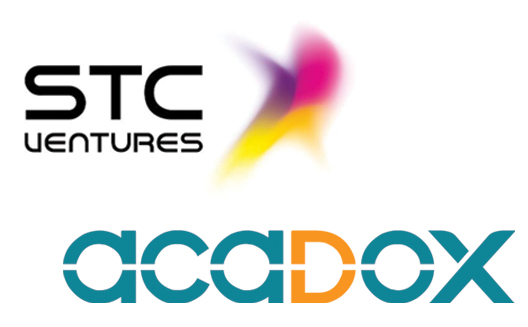STC Announces First Investment in Saudi-Based Education Platform Acadox

 STC Ventures, the venture capital arm of
Saudi Telecom Company (STC), has announced investment in Acadox, a Saudi Arabia-based e-learning
platform that allows students and teachers to manage and supplement
coursework online.
STC Ventures, the venture capital arm of
Saudi Telecom Company (STC), has announced investment in Acadox, a Saudi Arabia-based e-learning
platform that allows students and teachers to manage and supplement
coursework online.
The series A funding, of an undisclosed amount, is for a
significant minority stake, reveals Iris Capital, the fund manager for STC
Ventures. It's the first for the venture capital vehicle, which
specializes in startups and small and medium-sized companies in IT,
telecom, and digital media sectors. With a $250 million fund, STC
Ventures typically invests between $1 and $5 million, says Partner
Aiman Alatiqi.
Acadox, which was first built with support from the King Abdullah
University of Science Technology (KAUST) Seed Fund, caters to
educational organizations in the Arab world, focusing on Saudi
Arabia, with a product similar to U.S.-based Blackboard.
“We were inspired by the inefficiencies of Blackboard,”
founder Mustafa Nabulsi clarifies. Nabulsi, who is originally
Syrian, born in Saudi Arabia, co-founded the platform with two
friends from high school- fellow Syrian Nedal Mourad and Mohammad
Al-Hareeqi, a native Saudi.
After Nabulsi and Mourad left the country to pursue Master’s
degrees at the University of Manchester and Stanford respectively,
they reconvened at KAUST, where they developed the idea for an
e-learning platform that could offer them what they were missing.
Once they wooed Al-Hareeqi from his job at manufacturing giant
SABIC, they decided to apply to KAUST’s Seed Fund, where they won
support to build a platform that could offer, as Nabulsi describes,
“academic management, professional management, and social
management all in one place.” (For more on the platform’s origin,
read his
article).
Acadox now offers four main elements: course management, portfolio
management, analytics, and a mobile platform along with APIs. Its
course management allows teachers to organize and deploy coursework
and interact with students, while its portfolio management feature
allows students to view their achievements, progress, and
activities.
Advantages over Blackboard and similar platforms include its social
dimension, says Nabulsi. Students can send and receive information
with peers about coursework, contact professors at other
universities within the network, and create discussion groups,
study groups, and private courses to teach each other, thus
obviating the need for, say, a Facebook discussion group.
“When their studies are complete, they can also click a button to
print out a professional CV,” he points out, illustrating a feature
that will no doubt help the legions of job seekers who struggle
with CV formatting in the region.
Another big advantage is Acadox’s Arabic interface. “There are
basically no competitors in the local market with a similar
product,” says STC Venture’s Alataqi. “Most universities rely on
e-learning systems from the U.S., which are mostly in English. A
few have Arabic-enabled functionality, but their right-to-left
functionality is not well developed.” As anyone who’s used Arabic
in a left-to-right context knows,
RTL support is crucial for making a learning platform
efficient.
“With around 1 million students and 1,000 educational institutions, Saudi Arabia is a great market for the platform,” says Alatiqi. The government itself has spent over 8 billion SAR (US $2 billion) in recent years on higher education and IT, he says.
After being shortlisted as a semifinalist in MIT’s Arab
Business Plan Competition a year ago, Acadox has grown to serve
users and faculty members from over 200 communities and colleges,
including some from Mexico, Asia, Jordan, Oman, Saudi Arabia, and
Egypt. Its basic services are free, while its premium platform is
being piloted at KAUST, two training institutes in Oman, and four
other universities in Saudi Arabia.
What will the team do with its funding? “Go to Hawaii,” Nabulsi
jokes. “No, in fact, we’ve doubled our team members, relocated our
headquarters to Jeddah, and will be expanding our partnership
activities and sales and marketing," he reveals.
Further developing the platform to cater even more closely to user
needs will also be a major focus. “Eighty to ninety percent of our
focus will be in Saudi Arabia, but we're keeping our eyes on the
Omani and Egyptian markets as well.”
STC is betting on their demonstrated dedication. “One of the things
that set the Acadox team apart was that the founders really knew
what they wanted and what their reasonable next steps were,” says
Alatiqi. “I’ve seen a lot of entrepreneurs in Saudi who are very
raw, and needed a lot of hand holding. These were different, partly
due to the support that KAUST provided them.”
If the platform is successful, the founders may even be able to
help Syria rebuild after the conflict one day. “However we can help
by fostering education and rebuilding the learning environment in
the country, we will not hesitate to do so, from a personal
perspective,” says Nabulsi.
For more on Acadox, see their video below:

